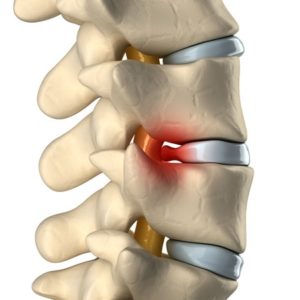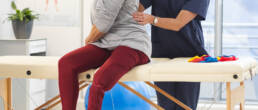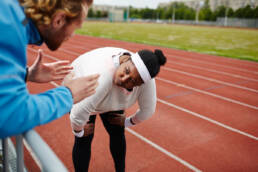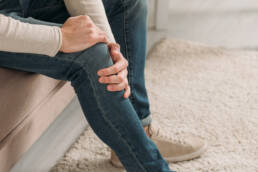For patients suffering from chronic back pain, a herniated disc is one of the more common causes. Though they’re most common in the lumbar spine or the lower back, they may also occur in the thoracic spine or the upper back. Herniated disc symptoms vary slightly from patient to patient and depending upon the location of the herniation.
Properly diagnosing a herniated disc requires diagnostic imaging tests, but there are a few signs that could point toward this common problem. If you are experiencing any of the symptoms below, we advise you to contact us right away to avoid additional pain and further damage.
Herniated Disc Symptoms
Symptoms of a Herniated Disc in the Lumbar Spine
Roughly 90% of herniated discs are located in the area known as L4-L5 and L5-S1. Herniated discs in this area cause pain in the L5 disc of S1 space that radiates down the sciatic nerve and causes leg pain, weakness or numbness. Most patients who have herniated discs at L4-L5 experience sciatica symptoms, weakness when raising the big toe, and pain or numbness on top of the foot.
When a disc is herniated at L5-S1, it typically compresses the S1 nerve, causing weakness when standing on the toes, sciatica, and numbness and pain that is felt in the sole of the foot.
Symptoms of a Herniated Disc in the Cervical Spine
Herniated discs in the cervical spine aren’t as common as herniated discs in the lumbar spine. Patients suffering from herniated cervical discs may experience shoulder pain or weakness in the deltoid muscle, which is located in the upper arm. If you have a herniated cervical disc, you may also experience numbness, pain or tingling that radiates to the thumb side of your hand, weakness in your bicep or triceps or weakness when trying to grip.
The exact symptoms of a herniated cervical disc vary, so it’s important to seek treatment for any unusual symptoms.
Physical Therapy for Herniated Discs in Denver
If you’re suffering from a herniated disc, contact Denver Physical Medicine & Rehab for physical therapy for herniated discs. We offer safe and effective treatment for herniated discs, including physical therapy, medical massage, spinal decompression, etc. To learn more or to schedule a consultation, please call 303-757-7280 today.
Ready for an expert opinion? Get in touch today!
Discover how physical therapy can help manage scoliosis in mild to moderate cases, along with other ways it offers healthcare solutions. Learn more from Dr. Mansi Dua, DPT, C2 Schroth Certified.
Like this article? Spread the word!
Related Posts
May 15, 2025
Get Moving This Summer: How Physical Therapy at Denver Physical Medicine & Rehab Can Improve Your Health
Get ready for an active summer with physical therapy at Denver Physical Medicine & Rehab.…
April 15, 2025
Spring into Motion: Why Now is the Perfect Time to Start Physical Therapy
Discover why spring is ideal for starting physical therapy. Custom rehab, massage therapy…





